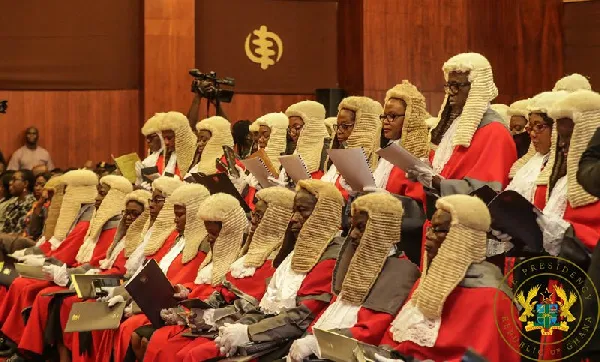The ongoing debate over judicial power in Ghana has ignited fresh concerns about the integrity of the country’s constitutional democracy.
The controversy stems from comments made by Freddie Blay, the former NPP chairman and CPP stalwart, who suggested that presidential term limits may not be absolute because, in his words, “the law is in the bosom of the judge.”
In response, Professor Stephen Kwaku Asare has delivered a scathing critique, calling Blay’s remarks not only “disappointing” but “dangerous.”
Prof. Asare expressed alarm that a figure of Blay’s stature would cast doubt on such a critical pillar of constitutional governance.
“But worse still, he is not alone. The bosom theory—the idea that law bends to the disposition of the judge—has gained quiet traction across the bar, the bench, and even the classroom. It must be debunked.”
Professor Stephen Kwaku Asare
He emphasized that judges are not the creators of the Constitution but merely its interpreters. “Their bosoms are not vaults of personal preference but vessels of constitutional fidelity.”
According to him, any suggestion that the constitutional two-term limit for presidents might be open to interpretation is an invitation to constitutional instability.
Prof. Asare warned that embracing such views threatens the very foundation of the rule of law.
He argued that allowing judges to redefine constitutional mandates based on personal inclination undermines legal certainty.
“Laws must mean the same thing today as they did yesterday. If judges can redefine ‘two terms’ based on personal whim, the Constitution becomes a moving target.”
Professor Stephen Kwaku Asare

Midway through his critique, Prof. Asare elaborated on the broader consequences, saying that it also “weakens judicial legitimacy.”
He underscored that the public’s respect for judges hinges on their faithful application of the law, not on personal inventions. “The bosom theory turns courts into partisan tools and drains public confidence in justice.”
Accordingly, Prof. Asare warned that the theory creates a pathway for authoritarianism, allowing leaders to extend their stay in power, accumulate more authority, and operate without accountability, ultimately transforming constitutional republics into personal fiefdoms.
Judicial Power Struggle Threatens Ghana’s Democracy
Moreover, Prof. Kwaku Asare emphasized that the implications go even deeper.
He explained that this dangerous ideology fosters strategic litigation, where political actors disregard the actual law and focus instead on the composition of the judicial panel, turning the legal process into a game of chance rather than one grounded in constitutional principles.
“It corrupts judicial appointments. If law lives in the judge’s bosom, politicians will only appoint judges whose bosoms match their ambitions. Judicial independence dies—not with a bang, but with a quiet nod and a partisan handshake.”
Professor Stephen Kwaku Asare

He also condemned the weakening of constitutional authority, warning that it would reduce the Constitution from a binding legal framework to something optional.
In his view, this approach transforms clear legal rules into flexible interpretations, undermining the rule of law and replacing consistency with subjective discretion.
The damage wouldn’t end there. Prof. Asare warned that the practice could lead to “panel rigging,” where cases are no longer assigned randomly but deliberately manipulated to ensure favorable outcomes.
“It’s no longer just which court hears your case, but which judges. Panels are no longer randomly assigned—they’re curated, reshuffled, even delayed to get the ‘right bosom.’”
Professor Stephen Kwaku Asare
In his assessment, this form of manipulation would eventually diminish the authority of Parliament while empowering select judicial panels.
When a few judges are able to distort clear constitutional provisions, the legislature loses its influence, and the Constitution becomes flexible and easily reshaped to fit various agendas.

He concluded with a stark warning, emphasizing that such judicial overreach undermines the principle of equality before the law.
According to him, in this scenario, well-connected individuals benefit from favorable judicial panels, while ordinary citizens are left at the mercy of unpredictable legal outcomes, eroding public trust in the justice system.
Ultimately, he delivered a stark reminder of the threats posed to the very foundation of democracy.
“It sabotages democracy from within: No tanks. No coups. Just ‘interpretation.’ That’s how democracies die—not by force, but by legal theatre. The text survives. The spirit doesn’t.”
Professor Stephen Kwaku Asare
As Ghana grapples with this unfolding debate, many observers fear that the nation’s hard-won democratic principles may hang in the balance, depending on how far this judicial power narrative spreads.
READ ALSO: Ghana’s Economy Beats 2024 Figures with 5.3% Growth in Q1 2025




















